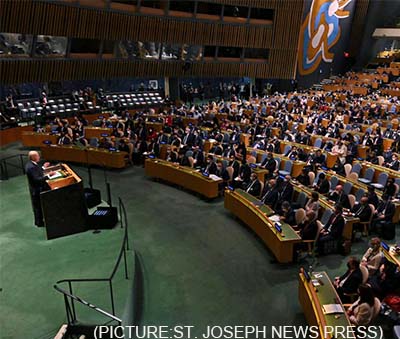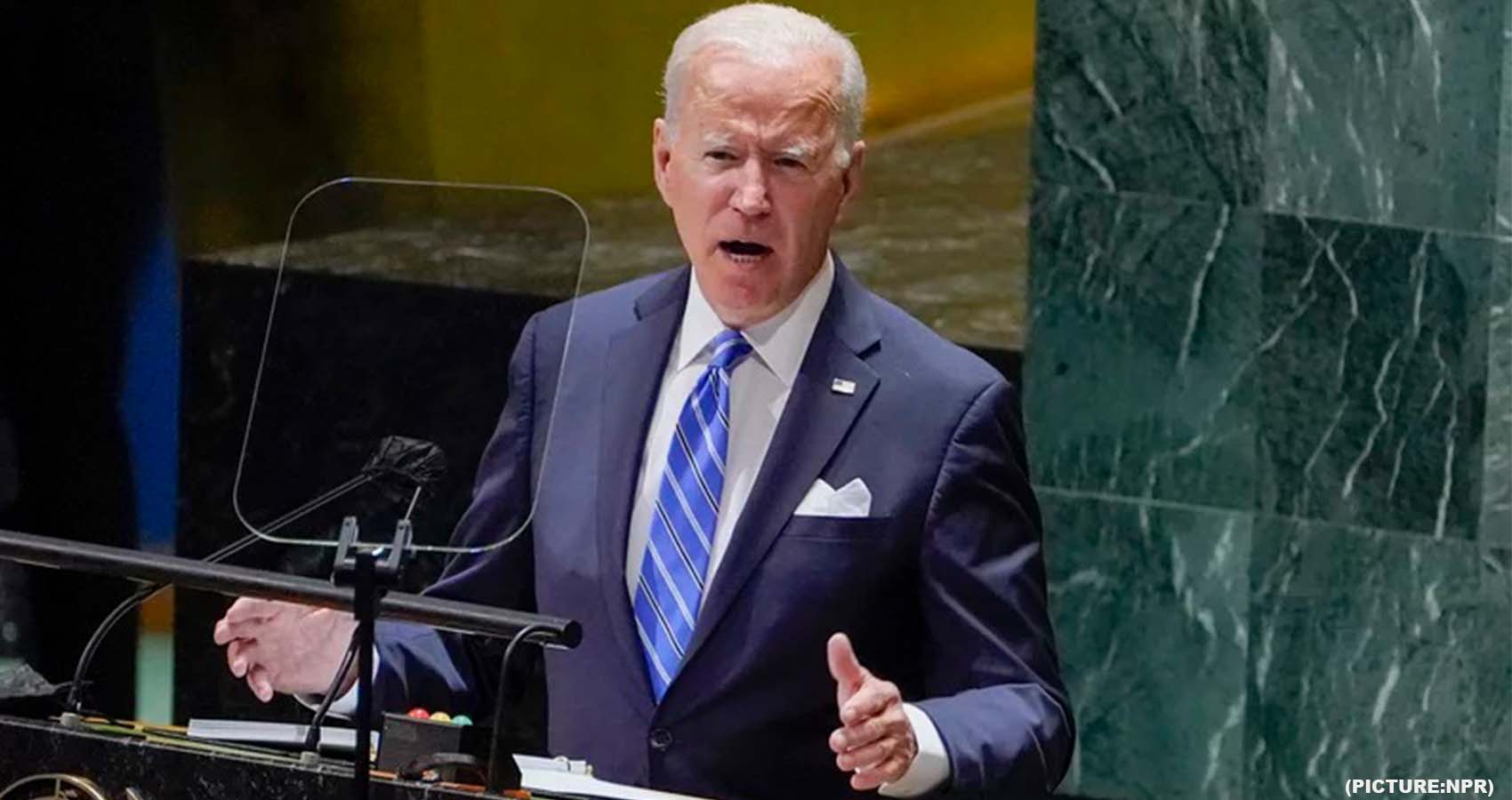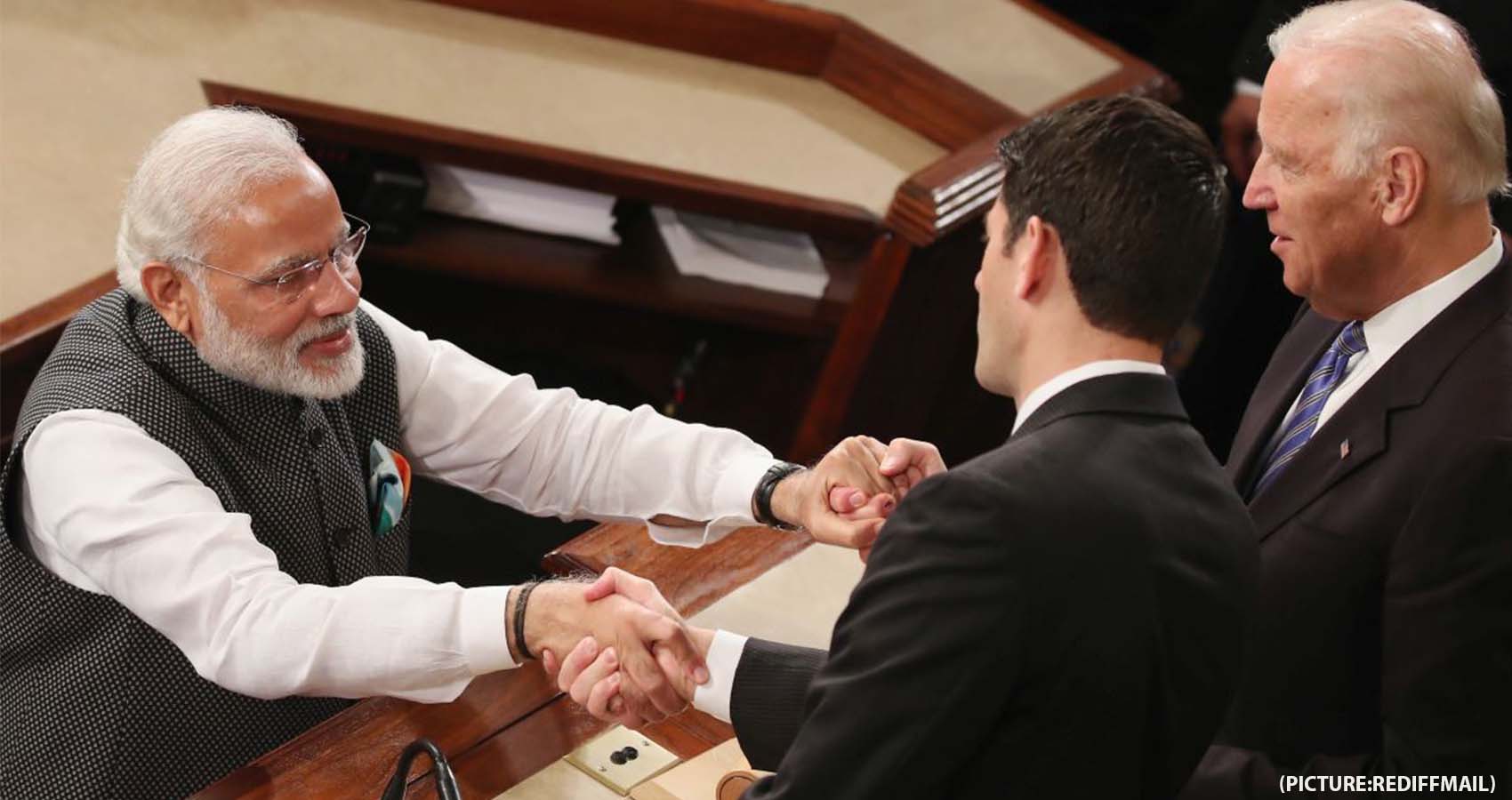Biden called the next 10 years a “decisive decade for our world” that will determine the global community’s future, and declared the planet stands at an “inflection point in history.”
Detailing his new approach to engage the world, Joe Biden, President of the United States told leaders of the world at the &6th annual session of the United Nations General Body on September 21, 2021that the United States is committed to working with the world in leading humanity out of the major problems that we have to confront, including the Covid 19 Pandemic and Climate Change. Speaking at the world body for the first time as president, Biden used the world stage to outline his administration’s aspirations for cooperation with the nation’s allies and called on nations to work together against COVID-19, climate change, human rights violations, and “new threats” from emerging technology.
 Biden used his address to describe a world where American civic leadership, rather than military power, acts as the driving force to resolve persistent problems like coronavirus, climate change, and cyberwar. Sharing his vision for leading the United States into a new era of diplomacy as he sought to reassure allies — some freshly skeptical — he was moving past the “America First” era of foreign policy, his predecessor had advocated for in the past four years. And while he didn’t single out China as the dominant global threat, he insisted the US would seek to counter rising autocracies while avoiding “a new Cold War.” Biden called the next 10 years a “decisive decade for our world” that will determine the global community’s future, and declared the planet stands at an “inflection point in history.”
Biden used his address to describe a world where American civic leadership, rather than military power, acts as the driving force to resolve persistent problems like coronavirus, climate change, and cyberwar. Sharing his vision for leading the United States into a new era of diplomacy as he sought to reassure allies — some freshly skeptical — he was moving past the “America First” era of foreign policy, his predecessor had advocated for in the past four years. And while he didn’t single out China as the dominant global threat, he insisted the US would seek to counter rising autocracies while avoiding “a new Cold War.” Biden called the next 10 years a “decisive decade for our world” that will determine the global community’s future, and declared the planet stands at an “inflection point in history.”
It was an altogether different message from his predecessor, whose mix of isolationism and confrontation caused deep rifts with other nations. Instead, Biden delivered a more traditional address hailing the United Nations’ mission of multilateralism and proclaiming a new chapter was beginning after he decided to end the war in Afghanistan. Biden said the U.S. “will lead on all of the greatest challenges of our time, from COVID to climate, peace and security, human dignity and human rights, but we will not go it alone.” The approach is a departure from that of the Trump administration, which embraced an “America first”-style of diplomacy that put nationalism ahead of multilateral efforts.
The global community’s response to pressing challenges like the climate crisis and the Covid-19 pandemic will “reverberate for generations yet to come,” Biden argued. But he said these challenges must be addressed with technological innovation and global cooperation, not war.”We’ve ended 20 years of conflict in Afghanistan, and as we close this period of relentless war, we’re opening a new era of relentless diplomacy, of using the power of our development aid to invest in new ways of lifting people up around the world,” Biden said.
The speech was a return to many of the themes Biden has spoken about since entering the White House in January, framing the future of global relations as democracy versus autocracy and emphasizing the US’ plans to strengthen relationships with its allies. That commitment is something many European nations are questioning in the wake of a diplomatic kerfuffle with the French over a new security partnership with the United Kingdom and Australia that cost the US’ longest ally billions in a deal for submarines. Foreign capitals have also questioned the mostly unilateral decision by the Biden administration to pull out of Afghanistan by the end of August after 20 years of war, leading to a chaotic withdrawal.
Biden did not address the submarine issue in his speech, but did defend his decision to leave Afghanistan. “As we close this era of endless war we are opening an era of endless diplomacy,” he said. Biden said the US is turning its focus to the Indo-Pacific region and is “fixing our eyes on devoting our resources to the challenges that hold the keys to our collective future.” The President said those challenges include: “Ending this pandemic, addressing the climate crisis, managing the shifts in global power dynamics, shaping the rules of the world on vital issues like trade, cyber and emerging technologies, and facing the threat of terrorism as it stands today.”
As a part of that shift in attention, the President made clear that he will be looking to use American diplomatic and scientific skills over military power as crises pop up around the globe. U.S. military power must be our last resort, not our first, and should not be used in response to every problem we see in the world, Biden said. Indeed, many of our greatest concerns today cannot be solved or even addressed by force of arms. Bombs and bullets cannot protect against Covid-19 or its future variants.”
“I stand here today for the first time in 20 years with the United States, not at war. We’ve turned the page,” Biden said. Despite some fears from its allies, Biden said the U.S. is committed to working with partners around the world to address challenges together, and stressed the importance of working through multilateral institutions such as the United Nations. “It is a fundamental truth of the 21st century that in each of our countries and as a global community, our own success is linked to others succeeding as well. To deliver for our own people we must also engage deeply with the rest of the world,” Biden said.
Biden pointed to the US shipping more than 160 million Covid-19 doses to countries around the world and putting more than $15 billion toward the global Covid response. He added that he would be announcing additional Covid-19 commitments on Wednesday at the US-hosted global Covid-19 summit. “We’ve lost so much to this devastating pandemic that continues to claim lives around the world and impact so much on our existence. We’re mourning more than 4.5 million people, people of every nation, from every background. Each death is an individual heartbreak. But our shared grief is a poignant reminder that our collective future will hinge on our ability to recognize our common humanity and to act together,” Biden said.
He stressed the urgent need to act to combat the climate crisis and noted his administration had pledged to double the public international financing to help developing nations tackle the climate crisis. Biden said he would work with Congress to double that number again, which would “make the United States the leader in public climate finance.” Biden urged countries around the world to “bring their highest possible ambitions to the table” when world leaders gather in Glasgow later this year for the COP 26 UN Climate Change Conference.
He pointed to the goal he set out earlier this year to reduce greenhouse gas emissions by about half from 2005 levels in 2030. Last week, Biden announced the US and European Union had launched a global pledge to reduce emissions of methane by nearly 30% by the end of the decade. The President said the US would continue to uphold the “long-standing rules and norms that have formed the guardrails of international engagement for decades that have been essential to the development of nations around the world.”



 He added, “Modi and Biden will review the robust and multifaceted ties between the India and the US. They will also deliberate on ways to further enrich India-US global partnership.”
He added, “Modi and Biden will review the robust and multifaceted ties between the India and the US. They will also deliberate on ways to further enrich India-US global partnership.” 